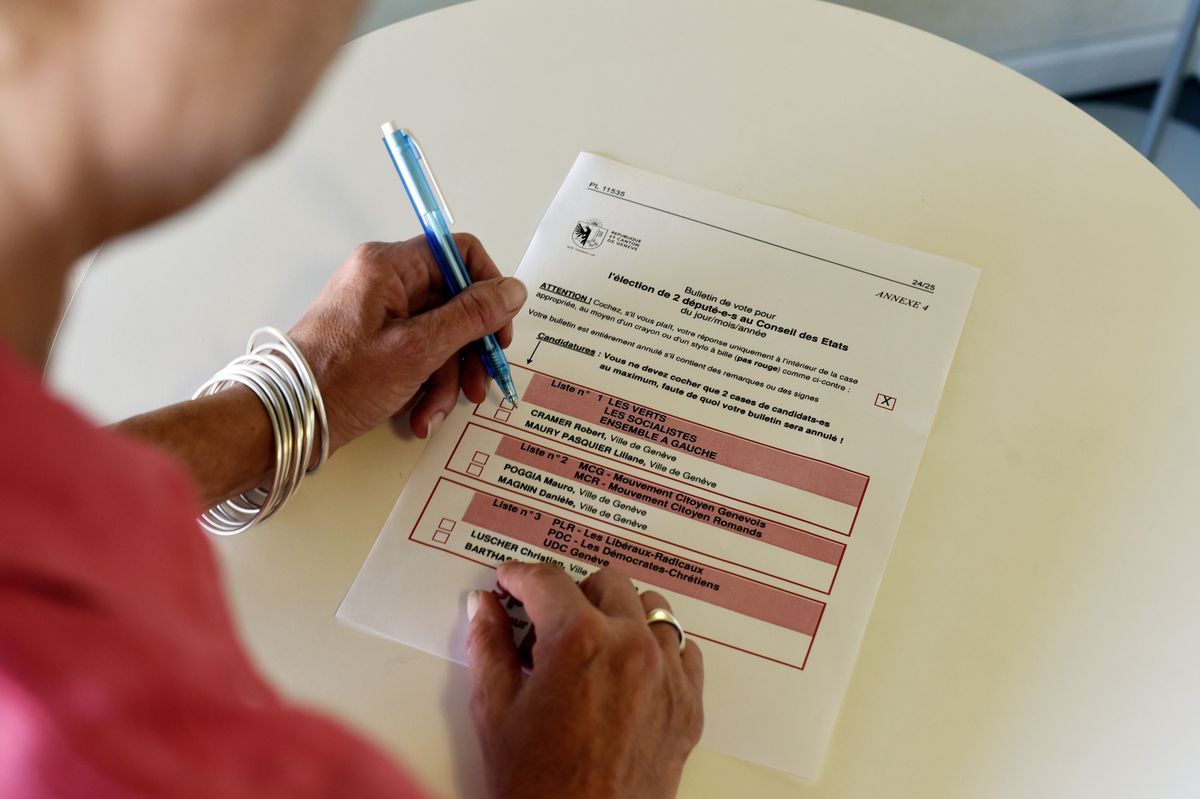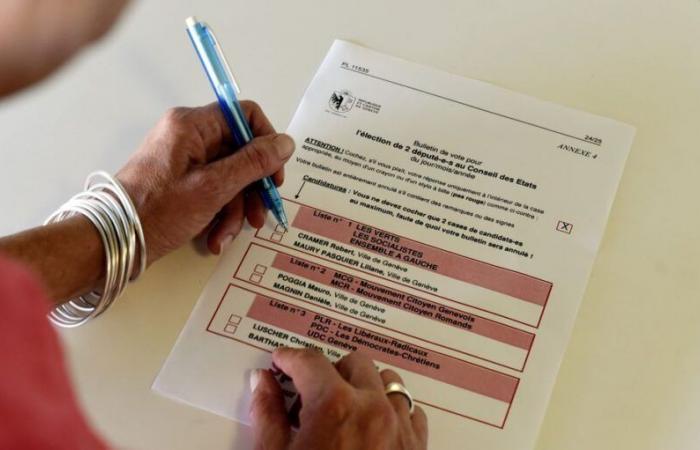ThoseMunicipal elections –Vernier’s affair highlights the voting voting votes
This instrument of direct Swiss democracy is based on confidence. It involves a share of risk assumed by the authorities.

Posted today at 12:04 p.m.

A lady fills a ballot during a former election in Geneva in 2015.
Laurent Guiraud
Subscribe now and take advantage of the audio reading function.
- Justice is investigating a potential electoral manipulation in Vernier
- No register makes it possible to check the authenticity of the signatures
- A gap pointed in the past in several parliamentary interventions
How to make sure that the person to whom a voting envelope is sent is the one who fills the bulletin? This is one of the challenges posed the case of modified bulletins which broke out during the municipal elections at Vernier. Answer: The Chancellery is unable to do so. A signature verification system does not exist in Geneva – or elsewhere in Switzerland.
In Vernier, Justice investigation On a potential electoral manipulation. Several criminal complaints and denunciations were filed following the discovery of a statistical anomaly during the election of the municipal council. More than 600 variegated bulletins in favor of the list of freedoms and social justice (LJS) also included, almost systematic, the names of three candidates of other parties (PLR, PS, MCG), each resulting from a distinct foreign community.
A phenomenon that lets fear from the existence of a harvesting system and filling virgin bulletins. The validation of the ballot was frozen.
Swiss particularism
This affair highlights the faults of correspondence voting. This instrument of direct Swiss democracy was introduced into most cantons in the 1990s. In 1995, precisely, in Geneva. Swiss particularism. Switzerland does not know the queues before polling stations, unlike France or the United States.
In Geneva, random checks were carried out for a few years: voters were questioned by phone after the vote. They were abandoned in 2002.
Only a device to check the date of birth exists. “The scan of the barcode appearing on the polling card gives a date that is compared with that listed by hand. If they agree, the vote is registered, ”specifies Anne Monnerat, head of assistant service to the Geneva Chancellery.
Risk share
The signatures are not authenticated. “The requirements may vary from one canton to another, but, as a rule, no real verification is carried out,” said Hans-Peter Schaub, political scientist at the University of Bern.
-If the cases of proven fraud are rare, they are not not non -existent. In 2021, around fifty lists had been modified in a similar way in Haut-Valais during the cantonal elections. An individual close to many voters had filled their bulletin with their consent. Justice classified the case, in particular because “the popular decision had not been altered”.
The authorities recognize (and assume) a share of risk. “The Swiss correspondence vote system is based on confidence both in institutions and in political rights holders,” said Anne Monnerat.
Questions to the Grand Council
Geneva therefore does not have a signature register or a database. This gap has been the subject of several parliamentary interventions, including those of the deputy of Eàg Pierre Bayenet.
In 2018, the one who is not yet a prosecutor with suspicion of electoral fraud in connection with the election of the Grand Council. A procedure is opened, but quickly classified by the Attorney General Olivier Jornot, As the “Tribune de Genève” told by establishing a link with the Vernier affair.
At the time, the deputy did not stay there. In a written question, it notes that the dates of birth of citizens can be obtained, for an emolument of 30 francs, with the Cantonal Population Office. He also relays “a lot of information reporting on voting cards disappeared from mailboxes, lost, even unused envelopes found entire in bins intended for paper recycling”.
The Council of State then recognizes that it cannot guarantee “a total absence of fraud”, but that it is “certainly marginal”. “The capture of votes can only very difficult to remain discreet,” he notes.
This “circulating, there is nothing to do” does not convince. A motion filed by Eàg, the PS and the MCG requires a restoration of random controls and the development of measures in order to remedy the risks of fraud.
In 2021, the Council of State made some proposals. In particular, it is a question of developing, in collaboration with the EPFL, an analysis tool for signatures. Hoped for 2024, the project is still “in progress”, according to the Chancellery.
“Latest news”Do you want to stay at the top of the info? “Tribune de Genève” offers you two meetings per day, directly in your e-mailbox. To not miss anything of what is happening in your canton, Switzerland or in the world.
Other newslettersConnect
Did you find an error? Please report it to us.
2 comments










